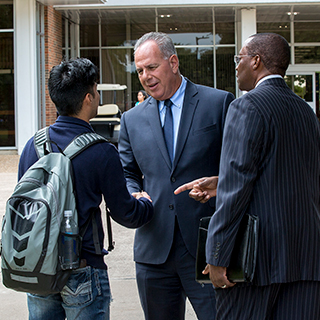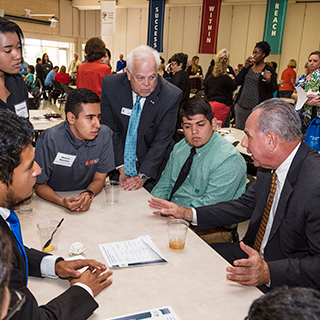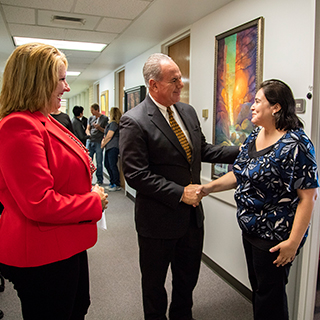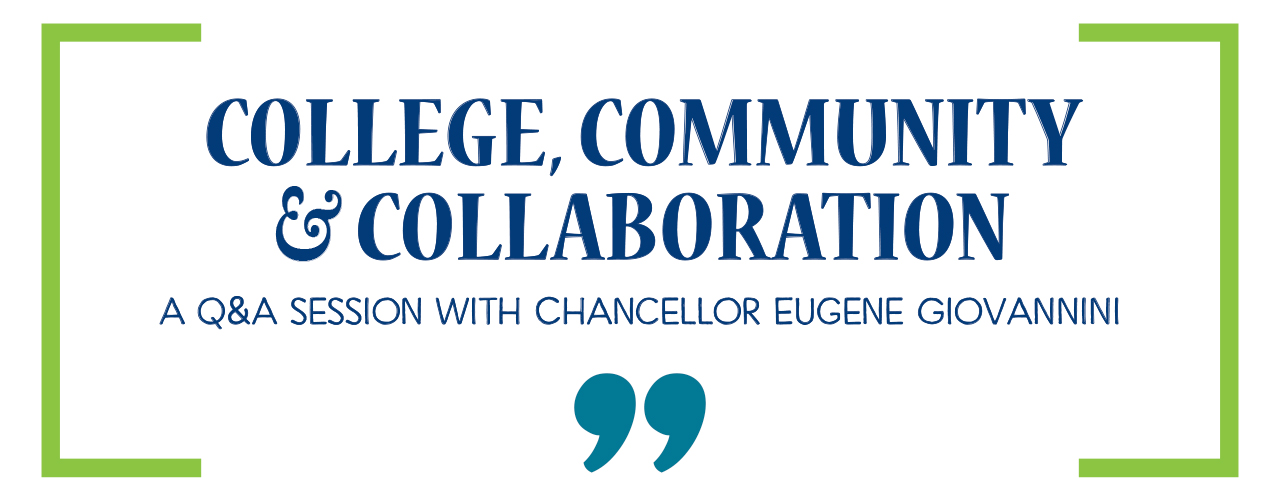College, Community & Collaboration
A Q&A Session with Chancellor Eugene Giovannini
A few months after TCC's fifth Chancellor, Eugene Giovannini, stepped into his new role, we had a chance to sit down and get his perspectives on the College, the community and how the two become even more collaborative.
 Q: You had served the Maricopa Community College’s system in several capacities over
several years. What inspired you to apply for the Chancellor’s post at TCC? And what
cemented your interest once the interview process was underway?
Q: You had served the Maricopa Community College’s system in several capacities over
several years. What inspired you to apply for the Chancellor’s post at TCC? And what
cemented your interest once the interview process was underway?
A: Even while at Maricopa, I was aware of Tarrant County College, primarily with my friendship with the former chancellor. Chancellor Hadley always talked about what a great place it was, so I did have some familiarity. When the opportunity became available, there were a few people who said, “This is something perhaps that might interest you,” and so as I looked at it and I became more and more interested. Specifically, more interested as I got to know more about the College and the College’s commitment, how ingrained TCC is into the community. Second, I was interested because of the community itself, which is a very unique situation in that the community embraces the College the way they do. I’m used to situations where you go meet people and they say, “Nice to meet you,” but here they also say, “Let me know what I can do to help.” That was across the board…not just one or two. So that told me a lot about the organization along with the community. So when you put it all together, it was a great opportunity.
Q: Based on your career in higher education, including several community college posts, what differentiates Tarrant County College?
A: I think it's the focus. There is a real understanding within the College community and employees of what we are here for, a sense of purpose. A lot of great work going on. I’ll go back to the Chancellor’s Breakfast (in August 2016) where 1,800 employees showed up and they actually competed to give presentations! That doesn’t happen everywhere. So that told me people have a real commitment to the institution and what we are doing, and not only serving the community but serving each other. That was quite unique. The other thing is many community colleges will say, “We are the best kept secret” or “We are taken advantage of” or whatever. Here, people really recognize and admire the value of the College and that sets it apart from other opportunities I’ve had.
 Q: What one word do you want TCC to “own” in the minds of our students, faculty, staff
and community constituents?
Q: What one word do you want TCC to “own” in the minds of our students, faculty, staff
and community constituents?
A: Service. Not just to our community and to our students, but to each other as well.
Q: How should TCC grow?
A: I think we grow through service. Not to be redundant, but the service is serving each other and serving students, serving the community. We are the community’s college and therefore we need to always respond to community needs…whatever those needs are. That’s just to maintain. We also need to be out front and anticipating what the needs of the community will be. How we are going to do that is by being involved and engaged in the community so that we are there and positioned to respond. That will maintain our viability and our growth.
Q: Along those lines, what more do you think we can be doing for Tarrant County?
A: I think we can do a better job at demonstrating what our value is and what we mean in terms of being an asset in this community. The more that's understood... the better that's understood…the more we are going to be tapped to serve that community.
Q: What is your vision for more actively involving area corporations and businesses with TCC?
A: I think it’s really incumbent among us to present ourselves as a resource to the business community, as a one point of contact to fulfill all their workforce solutions needs. Those needs can be across the board from advertising, to recruiting, to hiring, to onboarding, to assessing, ongoing training, through succession planning. If you take the full business cycle, the community college is positioned to deliver on the programs and services needed for that business…no matter what cycle they’re in…and to continue to deliver those as companies mature. A full workforce solution partner.
 Q: This is a bit theoretical, but when you think about how we measure our effectiveness
at TCC, what counts that we are not counting?
Q: This is a bit theoretical, but when you think about how we measure our effectiveness
at TCC, what counts that we are not counting?
A: A lot of the nontraditional activity that the College engages in. The one-day seminars, the noncredit training for a number of months or perhaps years. All that is of value, but unfortunately it doesn’t fall into the traditional measurements of what success is. It is really about understanding, valuing, recognizing, funding, promoting and delivering more and more of those programs and services that are not of a traditional nature. Not necessarily a credit hour, certificate or degree… those things are all important because they are our bread and butter, obviously. As the workplace changes, it changes in a manner in which the skillsets and competencies necessary don’t fall into the traditional requirement, if you will, for a degree or certificate. If you look at the top 10 jobs that are here today, in 2004, seven of them didn’t even exist. If you look at the top 10 jobs that are projected by 2030, seven of them don’t exist today. So how are we going to be responsive to that? We really don’t have the luxury, nor do we have the need, to respond to everything in a traditional method and so I think the future will be more in competency-based education. It’s going to be about demonstrating competency to require and develop a skillset and deliver on that skillset. The College will be challenged to deliver on those needs, which are not of a traditional nature of credit hour, certificate or degree.
Q: If we are sitting here a year from now celebrating what a great year it’s been for you in this role, what did you achieve?
A: Well, I think a couple things, hopefully! Building on our culture of one college with six unique campuses. That oneness is reflected in serving our constituents and serving each other. We become even more of a culture that is always ready to respond. And our community recognizes that we are of high value, not just importance, and that we are seen as an asset the community can’t do without.


![//parameter[@name='author']](/magazine/assets/images/authors/suzanne-c.jpg)